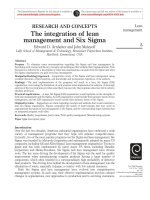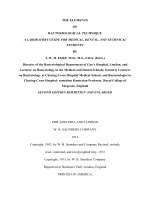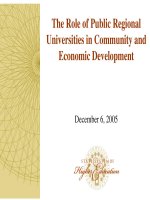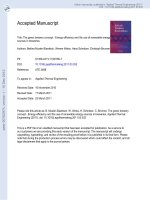- Trang chủ >>
- Văn Mẫu >>
- Văn Bản Mẫu
The Integration of Lafran Pane Thought in Material for Teaching History in Indonesian Student
Bạn đang xem bản rút gọn của tài liệu. Xem và tải ngay bản đầy đủ của tài liệu tại đây (165.6 KB, 6 trang )
<span class='text_page_counter'>(1)</span><div class='page_container' data-page=1>
35
Original Article
The Integration of Lafran Pane Thought in Material for
Teaching History in Indonesian Student
Umi Azizah
*<sub>, Djono, Akmad Arif Musaddad </sub>
<i>Faculty of Teacher Training and Education, UNS, Sebelas Maret University, Surakarta, Indonesia </i>
Received 17 December 2018
<i>Revised 05 April 2019; Accepted 17 April 2019 </i>
<b>Abstract: One of the goals history learning is to improve state defense attitude of students </b>
(patriotism and nationalism). To achieve these objective, innovative teaching materials that are not
monotonous are needed. This research aims to describe need historical teaching materials to
improve state defense attitude of senior high school students in Kebumen District, Indonesia. The
study used steps of needs analysis research, as a result of the research, it is show that: (1) historical
teaching materials used are still monotonous. (2) Based on results of the questionnaire, state
defense attitude of student also still needs to be improved. (3) Teachers need historical teaching
materials that can improve state defense attitude of students.
<i>Keywords:</i>Historical learning, material teachings, state defense attitude.
<b>1. Introduction </b>
The era of globalization has made it easier
for foreign cultures to enter the Indonesian
society. The rapid flow of technological
development makes it easy to access various
information from around the world in a very
short time. Technological change and
generational change often go hand in hand
(PRC, 2010: 25) [1].
The existence of globalization has brought
many positive impacts on the development of
Indonesia. One of them is the development of
technology advanced and facilitate the activity
_______
<sub> Corresponding author. </sub>
<i> E-mail address: </i>
/>
of daily life. However, globalization also has a
negative impact on the people of Indonesia.
One of them is to dissolve local cultural values
in everyday life, the low state defense attitude
especially among the younger generation.
</div>
<span class='text_page_counter'>(2)</span><div class='page_container' data-page=2>
fields of technology and media, has influenced the
arts and culture of Indonesian society.
Seeing the development of globalization
that continues, then a way is needed to
overcome this problem. One of them, by
increasing the attitude of defending the country
through learning history. Historical learning
that aims to build a collective memory as a
nation to know its people and build a sense of
unity, should be able to bridge students in
maintaining and increasing their love for their
nation and country. Therefore, historical
learning must be supported by media and
adequate learning resources.
Seeing the current phenomenon, there are
still many history teachers who only use
textbooks from the government, Illustrated
images and short videos of past history that
have often been seen by students in history
books, television and other social media. While
there are still many historical archives and other
historical events that are still unknown
to students.
Low understanding of the nation history,
will affect students towards a sense of
nationalism and attitude to defend the nation.
Learning history in Indonesia is a learning that
has a strategic meaning in the formation of
character and civilization of Indonesia. and in
the formation of Indonesian people who have a
sense of nationality and love for the country
(Hatikah et al, 2018: 15) [5]. To improve
attitude of defending the students' state through
historical learning, can be done by integrating
the thoughts of hero figures that contain the
values of state defense in historical teaching
materials. One of the heroes whose thoughts
contain the values of state defense is
Lafran Pane.
Lafran Pane is an Indonesian hero who was
appointed as a National hero on November 6,
2017. Lafran Pane figure is rarely known by
senior high school students. Historical teachers
can take advantage of the thoughts of hero
figures that are still rarely known by students.
History does not only talk about events in the
past, but also about figures who have names in
the event.
Developing historical teaching materials by
integrating the thoughts of hero figures that
contain values of state defense is an alternative
to improve state defense attitude of student. The
importance of defending country in face of
globalization is currently a challenge for history
teachers be able to improve the state defense
attitude of students through learning history.
This research aims to determine the historical
learning needs in improving state defense
attitude of students the current era.
<b>2. Methodology </b>
This study is only limited to the needs
analysis that comes from results of preliminary
observations in field and also studies of relevant
literature. According to Borg and Gall (1983:
<i>753) [6], a need is usually defined as a </i>
<i>discrepancy between an existing set of </i>
<i>conditions and desired set of conditions. Needs </i>
analysis is very important before doing product
development. McCawley (2009: 4) [7], there
are seven steps taken in carrying out a needs
analysis, that is write objectives, select
audience, collect data, select audience sample,
pick an instrument, analyze data, and the last
follow up.
</div>
<span class='text_page_counter'>(3)</span><div class='page_container' data-page=3>
<b>3. Results and discussion</b>
Data from field observations show that
historical learning at Kutowinangun senior
High School is still focused on teaching
materials provided by the government. This is
evidenced by the history book owned by
students only textbooks from the government.
The teacher delivers the material in accordance
with guidelines in the syllabus and displays a
few historical videos that are often seen by
students in learning process. In one semester,
only one two times the teacher invites students
to watch historical films in one meeting.
Sometimes, the film has been shown on
television or other social media. In this case the
teacher does not develop the historical learning
material. The interview results show that the
policy is very short time for historical subjects,
namely 2 hours in one week. In addition,
facilities and infrastructure are also less
supportive for developing materials through
<b>learning teaching materials. </b>
The results of the questionnaire on the state
defense attitude, shows the number 12% of
students who have a high state defense attitude,
56% for the low category, and 32% for the
medium category. This shows need for an
increase in state defense attitudes for students.
Looking at the results of the questionnaire
calculations, historical teaching materials are
needed that can be used to improve the state
defense attitude of students'. Some students also
say that not a little material has been discussed
at the previous level, discussed again at the next
level. So that their knowledge is limited to the
material in the textbook. The development of
historical teaching materials about thought
Lafran Pane is an alternative way to answer the
above problems. The teacher and students agree
to the development. With the development of
teaching materials from historical material that
students have never known. they hope to add
historical insight and literacy about their nation.
<i>3.1. The results analysis of Lafran Pane thought </i>
Lafran Pane besides being a national hero in
Indonesia, he is also an intellectual. He is not a
politician but a figure who is involved in the
field of education. even though he was a
founder of the Islamic Student Association
(HMI) organization in Indonesia. His thoughts
on the attitude of an Indonesian Intellectual
contained state defense values which could be
used as historical learning material to improve
the state defense attitude of student. The
thoughts about the attitude of an Indonesian
intellectual are as follows (Satria, 2010:
187-255) [8]:
<i>First, with the majority of the Indonesian </i>
people who are Muslim, Lafran Pane
emphasizes to believe in the perfection of the
teachings of Islam. With his adherence to the
teachings of Islam, the Indonesian people will
not be colonized by the Dutch in a very long
time. Because the invaders at that time
understood the weak potential of Islamic
<i>education in Indonesia. Second, an intellectual </i>
must have a balance between world science and
religious knowledge. World science will guide
him in matters of life in the world, and religion
will be a guideline in carrying out world affairs.
So they have a firm grip and are not easily
affected by influences from outside parties,
<i>especially in the nation and state. Third, an </i>
intellectual must be able to carry out reforms in
various fields for the progress of his nation and
<i>country. Fourth, an intellectual must be able to </i>
create harmony in religion, both in fellow
<i>religion and between religions. Fifth, they must </i>
be able to become fighters in elevating the
<i>dignity of Indonesia. Sixth, the ideology of </i>
Islam and nationality as the starting point
of movement.
</div>
<span class='text_page_counter'>(4)</span><div class='page_container' data-page=4>
The form of love the homeland found in the
thought of Lafran Pane is maintaining harmony
in religion, contributing as a reformer of
thoughts in various fields for the advancement
of the nation and state, as well as being ready to
sacrifice for the nation.
Awareness of the nation and state, believe
in Pancasila as the ideology of nation are found
in the thought of Lafran Pane, namely making
the ideology of religion (Islam) and nationality
(Pancasila) as the starting point of their
movement. The value of state defense the next
is to be willing to sacrifice for the nation and
state. This value is found in Lafran Pane's
thought that an intellectual must have
awareness as a warrior for the nation and state.
Which means that as a nation must be prepared
to sacrifice everything in every time for the
nation. The final value is having the ability to
state defend by having a balance between
science and religion. The initial ability to state
defend does not have to take military service,
but it can also be done by studying hard, having
extensive knowledge and experience.
Thought of Lafran Pane about the attitude
of an Indonesian intellectual and the values
contained therein are very important to be
taught to students today. Not only his thoughts,
life history to the contribution of Lafran Pane in
maintaining independence is also important to
be taught. So that students not only gain
knowledge from Lafran Pane's thoughts, but
also the spirit of heroism, nationalism, and
unyielding spirit. As stated by Sapriya (2009:
209) [10] that one of the scope of historical
learning is to contain the values of heroism,
exemplary, pioneering, nationalism, and
unyielding spirit that underlie the process of
forming students' character and personality.
<i>3.2. Integrate Lafran Pane thought in teaching </i>
<i>materials for historical learning </i>
The results of Lafran Pane's thought
analysis and the values contained therein show
that it is important to integrate into historical
learning teaching materials. The material in the
teaching material will later help the teacher to
improve state defense attitude of student.
Learning history is not only a process of
transferring ideas, but a process to mature
students in understanding the identity, and
personality of the nation by understanding
historical events (Zahro et al., 2017: 5) [11]. To
achieve these goals students are not only given
material about historical events, but also about
the history of thought and other history that can
add insight and knowledge of students about the
state of the nation and its country in the past in
various fields.
To integrate the thought of Lafran Pane in
historical teaching materials, it is supported by
learning models that are used according to the
curriculum issued by government. The learning
model is then applied in the teaching material,
so that the teacher feels easy in using teaching
materials. Students will also understand easily
when reading the teaching material. In
accordance with the curriculum used in
Indonesia, namely the 2013 curriculum, the
approach in teaching materials is complemented
by a scientific approach.
Integrate the thought of Lafran Pane in
historical teaching material must also refer to
the core competencies in the history learning
syllabus in Indonesia. Thought of Lafran Pane
is integrated in basic competencies 3.6 about
analyzing the role of national and regional
heros in fighting for Indonesian independence.
However, the values contained in Lafran Pane
thought can also be applied in other basic
competencies. by analyzing values that can be
integrated in accordance with the material on
these basic competencies.
</div>
<span class='text_page_counter'>(5)</span><div class='page_container' data-page=5>
The boredom that arises in students when
history is a separate obstacle for teachers.
Therefore, we must use objects that are close to
students, interesting historical material and still
rarely known by students. If students
understand history well then they will become a
nation that cares and is loyal to their homeland.
As stated by Gruev (Albena, 2011: 35) [13] that
to love and serve his country well, one must
know the history and geography of his country.
History is the subject of open social studies,
discussing various human experiences and their
development through time lines (Whelan, 2011:
55) [14]. Therefore, learning history does not
have to focus on material around colonialism,
independence, and world war, but also
discusses other historical events that continue to
emerge over time.
<i>3.3. Historical learning to improve state </i>
<i>defense attitude of student </i>
Historical learning has an important role in
enhancing state defense attitude of students. In
the current era of globalization, there is a
needed state defense attitude from every
Indonesian citizen, especially the student class.
Technological developments facilitate global
culture into life of the Indonesian people. So
that not a few students are affected by the
culture. Smith and Baylis (2001: 9) [15], one
sign of globalization is the emergence of global
culture. Smith and Baylis opinion is reinforced
by Sztompka (2004) [16] which states that
globalization is defined as a process that
produces a single world. This means that people
throughout the world depend on all aspects of
life, one of them in the cultural field.
Global culture will enter countries through
media and cause erosion of local culture in a
country. As stated by Joseph Klapper (1990)
cultural contact in the era of globalization is
very possible through media. So that it is mass
and involves many countries. Not only causes
cultural erosion, global culture can also lower
the love of the Indonesian nation's homeland.
Smith (2003: 166) [17] argues that waning love
of the nation's homeland begins with the idea
of a global culture based on electronic
mass communication.
The negative impact of globalization must
be resisted by the spirit of defending the
country, and reshaping the national identity
through historical education. Collingwood
(2001) [18], states that historical knowledge can
be used as the formation of national identity.
Hunt (2013) [19], also stated that, historical
learning has a purpose as the formation of
national identity, increasing the spirit of
nationalism, and developing a historical
awareness of the nation.
Integrating Lafran Pane thought into
historical teaching materials is the right choice
to improve state defense attitude of student.
Through his thoughts, Lafran Pane invited
Indonesian students to care about national
unity, culture, progress, and be ready to become
fighters for the nation and state of Indonesia,
and love for the homeland. Invite students not
to directly accept global culture. Instead,
analyze carefully, which parts are good and
which parts are bad.
<b>4. Conclusion </b>
</div>
<span class='text_page_counter'>(6)</span><div class='page_container' data-page=6>
<b>References </b>
[1] Pew Research Center, Millennials: Confident,
Connected, Open to Change, Pew Research
Center. on
23 November 2018/, 2010.
[2] Suneki, Sri, Dampak Globalisasi Terhadap
Eksistensi Budaya Daerah, Journal Ilmiah Civic. 2
(2012) 307-321.
[3] Mubah, A. Safril, Revitalisasi Identitas Kultural
Indonesia di Tengah Upaya Hegemoni Global,
Global & Strategis, Edisi Khusus. (2011) 251-260.
[4] Surahman, Sigit, Dampak Globalisasi Media
Terhadap Seni dan Budaya Indonesia, Jurnal
Komunikasi. 2 (2013) 29-38.
[5] Hatikah, Tika et al, Sejarah Indonesia: Modul
Pelatihan Implementasi Kurikulum 2013 SMA
Tahun 2018, Direktorat Jenderal Pendidikan
Dasar dan Menengah, Jakarta, 2018.
[6] Gall, Meredith Damien, Walter R. Borg, Joyce P.
Gall, Educational Research: An Introduction,
Longman Publishing, 2003.
[7] McCawley, F. Paul, Methods for cunducting an
educational needs assessment: Guidelines for
cooperative extension system profesionals,
University of Idaho, 2009.
[8] Satria, Hariqo Wibawa, Lafran Pane: Jejak Hayat
dan Pemikirannya, Lingkar, Jakarta, 2011.
[9] Widodo, Suwarno, Implementasi Bela Negara
Untuk Mewujudkan Nasionalisme, Jurnal Ilmiah
CIVIS I. (2011) 19.
[10] Sapriya, Pendidikan IPS Konsep dan Pembelajaran,
PT Remaja Rosdakarya, Bandung, 2009.
[11] Zahro, Mustika et al, The implementation of the
character education in history teaching, Journal
Historica. 1 (2017) 5-12.
[12] Purwandi, Lilik, Hasanuddin Ali, Indonesia 2020:
The Urban Middle-Class Millenials, PT Alvara
Strategi Indonesia, Jakarta, 2016.
[13] Albena, Hranova, History education and civic
education, Journal of Social science Education. 10
(2011) 33-43.
[14] Whelan, Michael, Why the studi of history should
be the core of social studies education: The social
studies curriculum, State University of New York
Press, New York, 2011.
[15] Smith, Steve, Baylis, John, The globalization of
world politics, 2nd edition, Oxford University
Press, Oxford, 2001.
[16] Sztompka, Sosiologi Perubahan Sosial, Prenada,
Jakarta, 2004.
[17] Smith, D. Anthony, Nationalisme theori, ideology,
history, LP3LS, Jakarta, 2003.
[18] R.C. Collingwood, The principles of history, Oxford
University press, New York, 2001.
</div>
<!--links-->
Sustainable Globalization and Emerging Economies: The Impact of Foreign Direct Investment in Thailand
- 14
- 768
- 1








